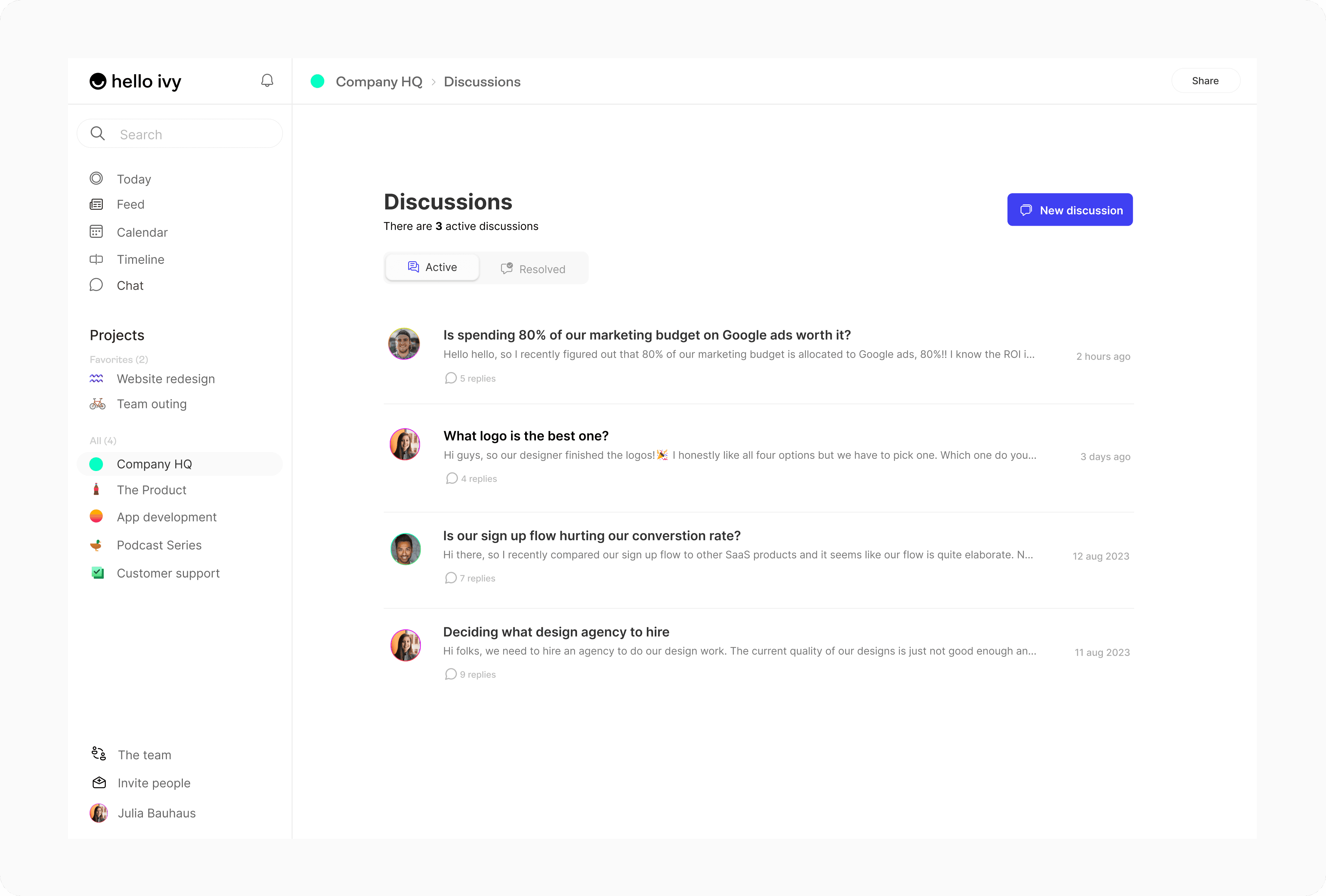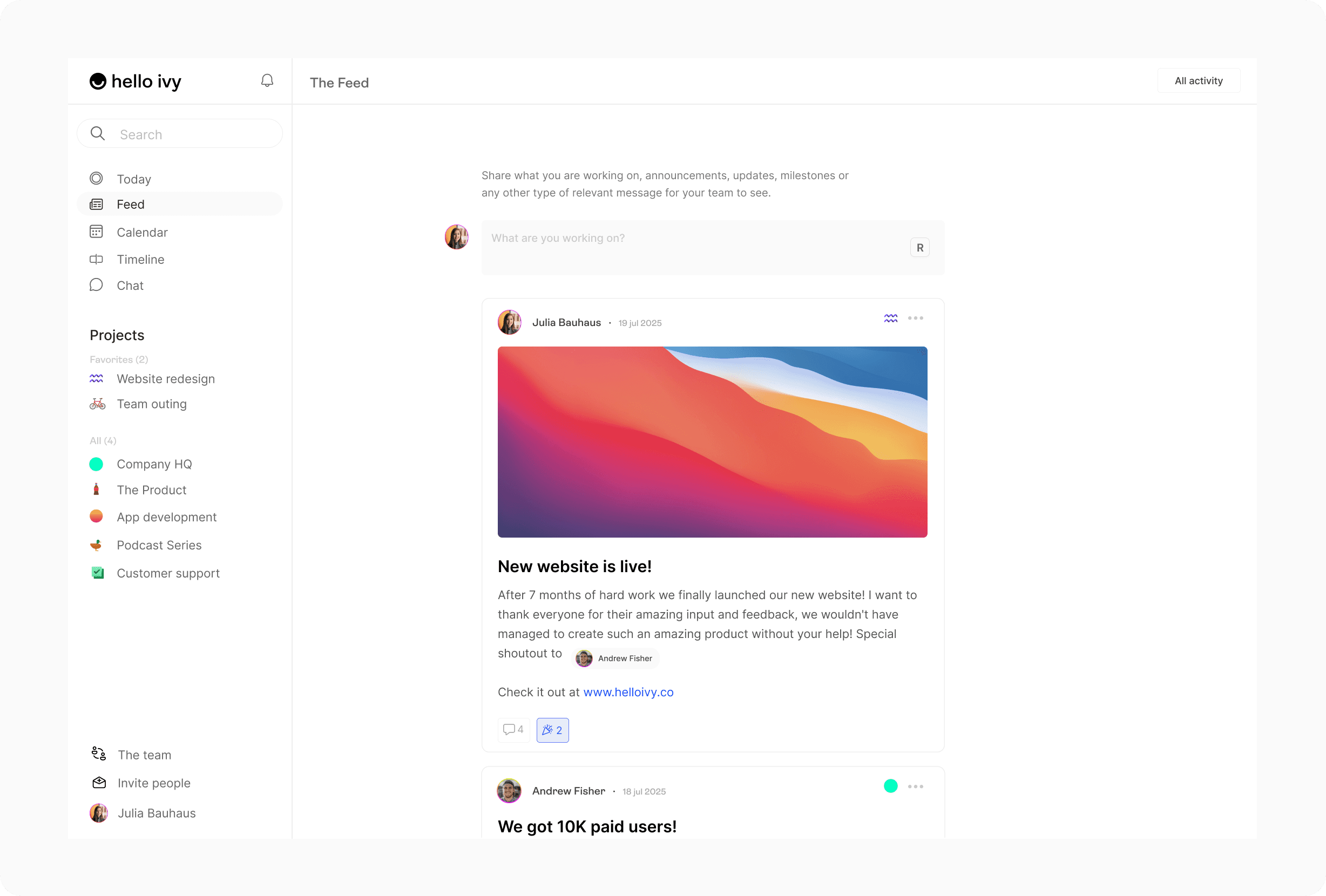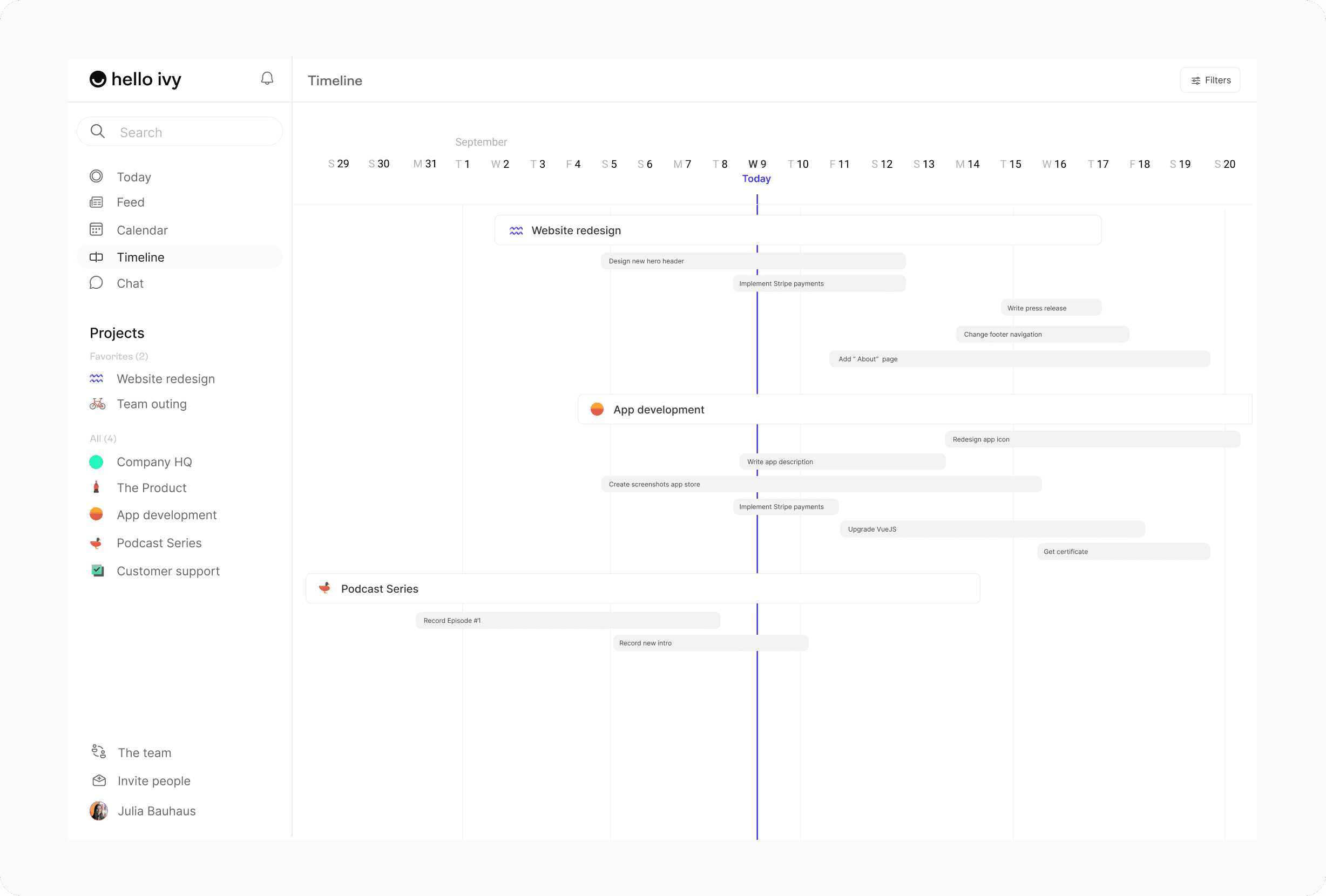Product Manager vs. Project Manager: What’s the Difference?
Product Manager vs. Project Manager: What’s the Difference?



Bob Stolk
·
Sep 7, 2023
Product managers and project managers might sound similar, but the two roles are in fact quite different. Key responsibilities of product managers revolve around the development of particular products, while the role of a project manager is more logistical, overseeing the coordination and management of the project as a whole.
In this article, we’ll explore the roles of product and project managers in more detail, to explain how they differ in terms of their responsibilities and the challenges they face. We’ll then discuss how the right software can be used to help these roles realise their potential.
What's the difference between a product and a project?
If we’re to understand how product managers and project managers work, we first need to think about the difference between a product and a project.
A product is something created to answer the needs or wants of a group of customers. This might be a physical product, like a household object or a new piece of technology, or it could be a service, like a takeaway delivery, a tutoring business or a tour guide provision.
Whether the end product is a physical item or a service, it tends to go through the same lifecycle, beginning with a development phase, before moving onto testing and, if successful, a launch to the market.
When we talk about projects, we’re referring to a number of different tasks that need to be accomplished before a business can achieve a certain objective.
Well managed projects have a set of specific deliverables and desired outcomes. Examples of projects can include anything from the redesign of a company’s website, to a change in communication processes within an organisation.
A project and a product aren’t as similar as they sound. In a business sense, these terms have quite different meanings, so it’s not surprising that the roles of project and product managers too are markedly different.
Let’s find out more about what these roles entail.
What is product management?
Product management is concerned with the specific products that an organisation is in the process of developing. Those working in this field take responsibility for the entire lifecycle of the product, beginning with initial concepts and moving right through to its launch.
What is project management?
Project management is the process of overseeing and coordinating all the work that goes into a project. Projects are seen through from beginning to end, taking into account any necessary collaboration with key stakeholders. A key part of project management is stakeholder interactions. Both sides need to be kept up-to-date with project statuses, expectations and timelines.

Product manager vs. project manager
As we’ve seen, a product manager and a project manager have distinct roles with little overlap.
The focus of a product manager is strategic. They’re responsible for everything from the initial ideas and vision for a new product, right through to its creation. Product managers must ensure their products meet the needs of an identified target market, and will take responsibility for how their end product will be launched to that market.
Project managers might have similar skills and experience to product managers, but their roles have a greater focus on logistics and tactics. Like product managers, project managers remain responsible for a project for the duration of its lifecycle. However their responsibilities revolve more around planning and the coordination of resources. Project managers also facilitate collaboration between team members and stakeholders.
What is a product manager?
A product manager is a professional with a strategic role in the business. Product managers are tasked with everything from coordinating market research and analysis, to coming up with the big ideas that will put a company on the map.
Product managers need to be creative and inspiring. They need to know how to work collaboratively with different team members, while also understanding the company’s key customers and new target markets.
Problem solving is a huge part of any product manager role. Unexpected issues can crop up at any time. It's down to the product manager to plan for potential problems and lead the team through any challenges that they might face.
Challenges of being a product manager
Product managers face a number of different challenges, ranging from the easily overcome to the more serious and complex.
Key issues tend to include any corrections that might be needed if a product fails to fulfil its objectives, and handling strict, tight deadlines. Any breakdowns in communication can spell trouble for product managers, who must work across different departments on a daily basis.
What is a project manager?
A project manager is a team member responsible for overseeing projects from start to finish. The role covers everything from the breaking down of a vast project into manageable tasks, to the delegation of these tasks to the professionals best suited to complete them.
Project managers collaborate and communicate, while also facilitating good communication channels between the departments involved in the project. Project managers also look after the resources available to teams for the completion of projects, with careful budgeting and allocation of any other resources required.
The project manager takes responsibility for the project as a whole, and that includes whether or not the project fulfils its objectives. The high pressure role includes plenty of problem solving, so project managers need to be flexible and capable of overcoming unforeseen challenges at late notice. This is why project managers benefit so much from easy collaboration and real-time progress visibility.

Project manager challenges
Project managers face all manner of challenges as they move projects through their life cycles. Some of the most common challenges that project managers come up against include problems with tracking that affect timelines and deliverables, which can lead to projects missing their targets.
Collaboration can also be challenging for project managers, particularly when projects are complex and involve a number of different departments across the business. No projects are completely risk-free, so project managers must always be one step ahead, capable of predicting risks and responding to them in a timely manner.
The right project management leads to product management success
Both product managers and project managers look to software to support their day-to-day operations. Not only can it help these professionals to overcome some of the most common challenges they face, it can also be immensely useful when it comes to improving visibility and time tracking, as well as collaboration between teams.
Product management tools are designed to help product managers organise, develop and communicate. These platforms should support a product manager’s high-level requirements, enabling the overall product vision to be communicated and executed clearly. The tools may also have visualization features that let teams create easily digestible timelines and roadmaps for tasks.
Project management software revolves around the logistical nature of this role. This software is designed to facilitate tracking and organising, to help project managers progress projects within a desired timeframe. Deadlines, tasks, resource allocation and to do lists are all covered by project management software.
A common misconception is that these two softwares have to be separate entities. In reality, it is entirely possible to have one platform with features for both product and project management. In fact, leveraging a project management tool within a product team often leads to success.

Our tool Hello Ivy, for example, is immensely useful for product teams. As an all-in-one platform, our simple project management software is designed to make collaboration, feedback, roadmapping and task management a lot easier.
Designed to help product teams understand what customers want, organise feedback, write elaborate documentation and complete projects on time, Hello Ivy enables product managers to build their best possible products, faster than ever before.
Contact the team at Hello Ivy to find out more!
Product managers and project managers might sound similar, but the two roles are in fact quite different. Key responsibilities of product managers revolve around the development of particular products, while the role of a project manager is more logistical, overseeing the coordination and management of the project as a whole.
In this article, we’ll explore the roles of product and project managers in more detail, to explain how they differ in terms of their responsibilities and the challenges they face. We’ll then discuss how the right software can be used to help these roles realise their potential.
What's the difference between a product and a project?
If we’re to understand how product managers and project managers work, we first need to think about the difference between a product and a project.
A product is something created to answer the needs or wants of a group of customers. This might be a physical product, like a household object or a new piece of technology, or it could be a service, like a takeaway delivery, a tutoring business or a tour guide provision.
Whether the end product is a physical item or a service, it tends to go through the same lifecycle, beginning with a development phase, before moving onto testing and, if successful, a launch to the market.
When we talk about projects, we’re referring to a number of different tasks that need to be accomplished before a business can achieve a certain objective.
Well managed projects have a set of specific deliverables and desired outcomes. Examples of projects can include anything from the redesign of a company’s website, to a change in communication processes within an organisation.
A project and a product aren’t as similar as they sound. In a business sense, these terms have quite different meanings, so it’s not surprising that the roles of project and product managers too are markedly different.
Let’s find out more about what these roles entail.
What is product management?
Product management is concerned with the specific products that an organisation is in the process of developing. Those working in this field take responsibility for the entire lifecycle of the product, beginning with initial concepts and moving right through to its launch.
What is project management?
Project management is the process of overseeing and coordinating all the work that goes into a project. Projects are seen through from beginning to end, taking into account any necessary collaboration with key stakeholders. A key part of project management is stakeholder interactions. Both sides need to be kept up-to-date with project statuses, expectations and timelines.

Product manager vs. project manager
As we’ve seen, a product manager and a project manager have distinct roles with little overlap.
The focus of a product manager is strategic. They’re responsible for everything from the initial ideas and vision for a new product, right through to its creation. Product managers must ensure their products meet the needs of an identified target market, and will take responsibility for how their end product will be launched to that market.
Project managers might have similar skills and experience to product managers, but their roles have a greater focus on logistics and tactics. Like product managers, project managers remain responsible for a project for the duration of its lifecycle. However their responsibilities revolve more around planning and the coordination of resources. Project managers also facilitate collaboration between team members and stakeholders.
What is a product manager?
A product manager is a professional with a strategic role in the business. Product managers are tasked with everything from coordinating market research and analysis, to coming up with the big ideas that will put a company on the map.
Product managers need to be creative and inspiring. They need to know how to work collaboratively with different team members, while also understanding the company’s key customers and new target markets.
Problem solving is a huge part of any product manager role. Unexpected issues can crop up at any time. It's down to the product manager to plan for potential problems and lead the team through any challenges that they might face.
Challenges of being a product manager
Product managers face a number of different challenges, ranging from the easily overcome to the more serious and complex.
Key issues tend to include any corrections that might be needed if a product fails to fulfil its objectives, and handling strict, tight deadlines. Any breakdowns in communication can spell trouble for product managers, who must work across different departments on a daily basis.
What is a project manager?
A project manager is a team member responsible for overseeing projects from start to finish. The role covers everything from the breaking down of a vast project into manageable tasks, to the delegation of these tasks to the professionals best suited to complete them.
Project managers collaborate and communicate, while also facilitating good communication channels between the departments involved in the project. Project managers also look after the resources available to teams for the completion of projects, with careful budgeting and allocation of any other resources required.
The project manager takes responsibility for the project as a whole, and that includes whether or not the project fulfils its objectives. The high pressure role includes plenty of problem solving, so project managers need to be flexible and capable of overcoming unforeseen challenges at late notice. This is why project managers benefit so much from easy collaboration and real-time progress visibility.

Project manager challenges
Project managers face all manner of challenges as they move projects through their life cycles. Some of the most common challenges that project managers come up against include problems with tracking that affect timelines and deliverables, which can lead to projects missing their targets.
Collaboration can also be challenging for project managers, particularly when projects are complex and involve a number of different departments across the business. No projects are completely risk-free, so project managers must always be one step ahead, capable of predicting risks and responding to them in a timely manner.
The right project management leads to product management success
Both product managers and project managers look to software to support their day-to-day operations. Not only can it help these professionals to overcome some of the most common challenges they face, it can also be immensely useful when it comes to improving visibility and time tracking, as well as collaboration between teams.
Product management tools are designed to help product managers organise, develop and communicate. These platforms should support a product manager’s high-level requirements, enabling the overall product vision to be communicated and executed clearly. The tools may also have visualization features that let teams create easily digestible timelines and roadmaps for tasks.
Project management software revolves around the logistical nature of this role. This software is designed to facilitate tracking and organising, to help project managers progress projects within a desired timeframe. Deadlines, tasks, resource allocation and to do lists are all covered by project management software.
A common misconception is that these two softwares have to be separate entities. In reality, it is entirely possible to have one platform with features for both product and project management. In fact, leveraging a project management tool within a product team often leads to success.

Our tool Hello Ivy, for example, is immensely useful for product teams. As an all-in-one platform, our simple project management software is designed to make collaboration, feedback, roadmapping and task management a lot easier.
Designed to help product teams understand what customers want, organise feedback, write elaborate documentation and complete projects on time, Hello Ivy enables product managers to build their best possible products, faster than ever before.
Contact the team at Hello Ivy to find out more!
Compare PM tools
Compare PM tools
Compare PM tools